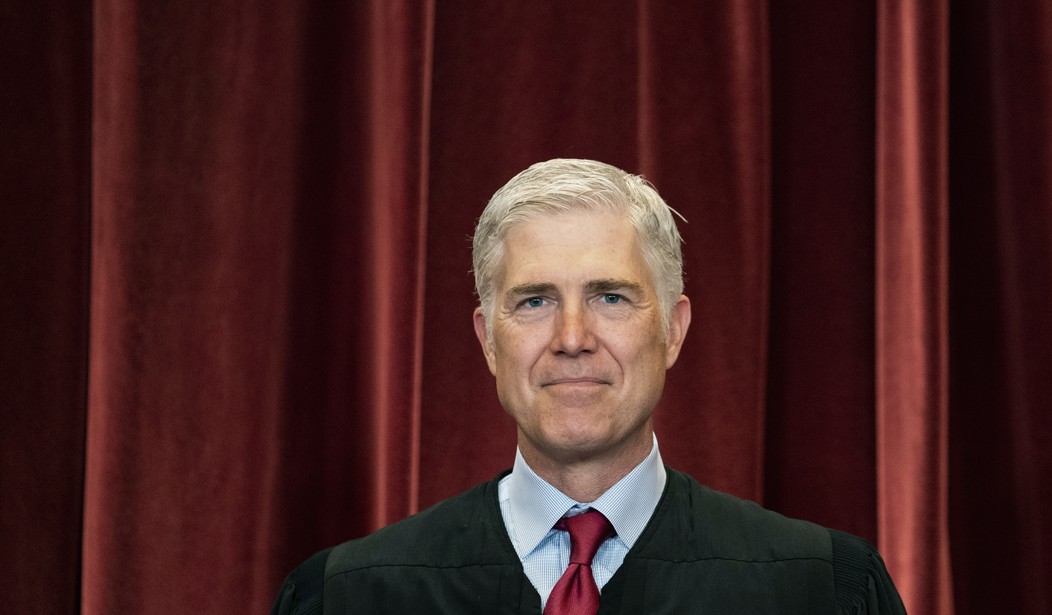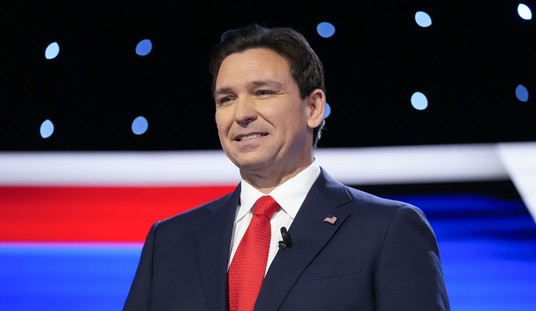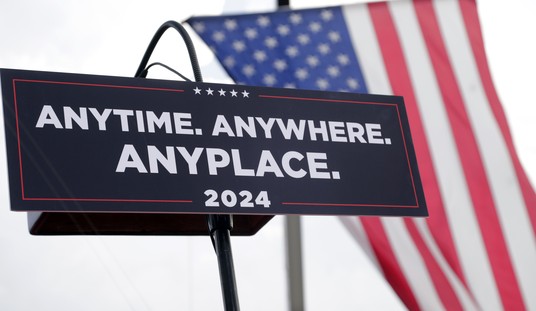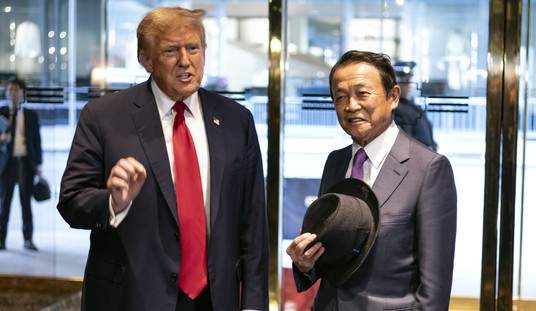Finally, indeed. Ever since Obergefell, the Supreme Court has punted on the crossover of public accommodation laws to forced compelled speech on behalf of protected-class customers, and Colorado has been the epicenter of that effort.
After a series of punts in the last decade, Neil Gorsuch put a forceful end to government-compelled speech in violation of First Amendment protections. Regardless of what higher purpose that government seeks to serve in forcing people to engage in speech that contradicts their own convictions, especially religious convictions, the First Amendment bars government from doing so, full stop:
As surely as Ms. Smith seeks to engage in protected First Amendment speech, Colorado seeks to compel speech Ms. Smith does not wish to provide. As the Tenth Circuit observed, if Ms. Smith offers wedding websites celebrating marriages she endorses, the State intends to “forc[e her] to create custom websites” celebrating other marriages she does not. 6 F. 4th, at 1178. Colorado seeks to compel this speech in order to “excis[e] certain ideas or viewpoints from the public dialogue.” Turner Broadcasting System, Inc. v. FCC, 512 U. S. 633, 642 (1994). Indeed, the Tenth Circuit recognized that the coercive “[e]liminati[on]” of dissenting “ideas” about marriage constitutes Colorado’s “very purpose” in seeking to apply its law to Ms. Smith. 6 F. 4th, at 1178.
We part ways with the Tenth Circuit only when it comes to the legal conclusions that follow. While that court thought Colorado could compel speech from Ms. Smith consistent with the Constitution, our First Amendment precedents laid out above teach otherwise. In Hurley, the Court found that Massachusetts impermissibly compelled speech in violation of the First Amendment when it sought to force parade organizers to accept participants who would “affec[t] the[ir] message.” 515 U. S., at 572. In Dale, the Court held that New Jersey intruded on the Boy Scouts’ First Amendment rights when it tried to require the group to “propound a point of view contrary to its beliefs” by directing its membership choices. 530 U. S., at 654. And in Barnette, this Court found impermissible coercion when West Virginia required schoolchildren to recite a pledge that contravened their convictions on threat of punishment or expulsion. 319 U. S., at 626–629. Here, Colorado seeks to put Ms. Smith to a similar choice: If she wishes to speak, she must either speak as the State demands or face sanctions for expressing her own beliefs, sanctions that may include compulsory participation in “remedial . . . training,” filing periodic compliance reports as officials deem necessary, and paying monetary fines. App. 120; supra, at 3. Under our precedents, that “is enough,” more than enough, to represent an impermissible abridgment of the First Amendment’s right to speak freely. Hurley, 515 U. S., at 574.
The consequences of allowing these laws are dire, Gorsuch continues:
Taken seriously, that principle would allow the government to force all manner of artists, speechwriters, and others whose services involve speech to speak what they do not believe on pain of penalty. The government could require “an unwilling Muslim movie director to make a film with a Zionist message,” or “an atheist muralist to accept a commission celebrating Evangelical zeal,” so long as they would make films or murals for other members of the public with different messages. Id., at 1199. Equally, the government could force a male website designer married to another man to design websites for an organization that advocates against same-sex marriage. See Brief for Petitioners 26– 27. Countless other creative professionals, too, could be forced to choose between remaining silent, producing speech that violates their beliefs, or speaking their minds and incurring sanctions for doing so. See, e.g., Brief for Creative Professionals et al. as Amici Curiae 5–10; Brief for First Amendment Scholars as Amici Curiae 19–22. As our precedents recognize, the First Amendment tolerates none of that.
Yesterday, I predicted that Gorsuch — the most libertarian of the current justices — might use this case to speak to the abuse of public-accommodation laws and regulations. Indeed he does, although first granting their importance in fighting against real and substantive access discrimination. However, Gorsuch goes on to argue that state and local governments have taken that too far in efforts to impose a political groupthink that has little to do with actual access:
At the same time, this Court has also recognized that no public accommodations law is immune from the demands of the Constitution. In particular, this Court has held, public accommodations statutes can sweep too broadly when deployed to compel speech. In Hurley, the Court commented favorably on Massachusetts’ public accommodations law, but made plain it could not be “applied to expressive activity” to compel speech. 515 U. S., at 571, 578. In Dale, the Court observed that New Jersey’s public accommodations law had many lawful applications but held that it could “not justify such a severe intrusion on the Boy Scouts’ rights to freedom of expressive association.” 530 U. S., at 659. And, once more, what was true in those cases must hold true here. When a state public accommodations law and the Constitution collide, there can be no question which must prevail. U. S. Const., Art. VI, cl. 2.
Nor is it any answer, as the Tenth Circuit seemed to suppose, that Ms. Smith’s services are “unique.” 6 F. 4th, at 1180. In some sense, of course, her voice is unique; so is everyone’s. But that hardly means a State may coopt an individual’s voice for its own purposes. In Hurley, the veterans had an “enviable” outlet for speech; after all, their parade was a notable and singular event. 515 U. S., at 560, 577–578. In Dale, the Boy Scouts offered what some might consider a unique experience. 530 U. S., at 649–650. But in both cases this Court held that the State could not use its public accommodations statute to deny speakers the right “to choose the content of [their] own message[s].” Hurley, 515 U. S., at 573; see Dale, 530 U. S., at 650–656. Were the rule otherwise, the better the artist, the finer the writer, the more unique his talent, the more easily his voice could be conscripted to disseminate the government’s preferred messages. That would not respect the First Amendment; more nearly, it would spell its demise.
Not only does that put a stake through the state’s efforts in 303 Creative, it also puts a firm end to their continued harassment of Jack Phillips and Masterpiece Cakeshop. Gorsuch points to the court’s earlier shrugs at essentially the same issue in a subtle rebuke of their reluctance to settle the issue. And the use of the Masterpiece Cakeshop cases by the dissent appears to have rankled Gorsuch even further:
The dissent is right about one thing—“[w]hat a difference” time can make. See post, at 2 (internal quotation marks omitted). Eighty years ago in Barnette, this Court affirmed that “no official, high or petty, can prescribe what shall be orthodox in politics, nationalism, religion, or other matters of opinion.” 319 U. S., at 642. The Court did so despite the fact that the speech rights it defended were deeply unpopular; at the time, the world was at war and many thought respect for the flag and the pledge “essential for the welfare of the state.” Id., at 662–663 (Frankfurter, J., dissenting); see also id., at 636, 640 (majority opinion). Fifty years ago, this Court protected the right of Nazis to march through a town home to many Holocaust survivors and along the way espouse ideas antithetical to those for which this Nation stands. See Skokie, 432 U. S., at 43–44; supra, at 17–18. Five years ago, in a case the dissenters highlight at the outset of their opinion, the Court stressed that “it is not . . . the role of the State or its officials to prescribe what shall be offensive.” Masterpiece Cakeshop, 584 U. S., at ___ (slip op., at 16). And just days ago, Members of today’s dissent joined in holding that the First Amendment restricts how States may prosecute stalkers despite the “harm[ful],” “low-value,” and “upsetting” nature of their speech. Counterman v. Colorado, 600 U. S. ___, ___ (2023) (slip op., at 6); id., at ___ (SOTOMAYOR, J., concurring in part and concurring in judgment) (slip op., at 5).
Today, however, the dissent abandons what this Court’s cases have recognized time and time again: A commitment to speech for only some messages and some persons is no commitment at all. By approving a government’s effort to “[e]liminat[e]” disfavored “ideas,” 6 F. 4th, at 1178, today’s dissent is emblematic of an unfortunate tendency by some to defend First Amendment values only when they find the speaker’s message sympathetic. But “[i]f liberty means anything at all, it means the right to tell people what they do not want to hear.” 6 F. 4th, at 1190 (Tymkovich, C. J., dissenting) (quoting G. Orwell).
An Orwell reference is not a compliment.
For the dissenter’s part, they manage to miss the point broadly. Sonia Sotomayor claims that the ruling will allow businesses to refuse to serve people on the basis of race or orientation:
Today, the Court, for the first time in its history, grants a business open to the public a constitutional right to refuse to serve members of a protected class. Specifically, the Court holds that the First Amendment exempts a website-design company from a state law that prohibits the company from denying wedding websites to same-sex couples if the company chooses to sell those websites to the public.
This is unadulterated nonsense, and it colors the entire dissent. In none of these cases did respondents refuse to serve people on any basis. They just refused to participate in events and messaging that offended their religious beliefs. The plaintiffs could have gone to other website designers, bakeries, and photographers for those purposes rather than force people into a choice between compelled offensive speech or financial ruin.
This at least firmly settles the issue, which the first such case should have done. Government cannot compel speech or participation in such events, and never should have done so in the first place. The shame of this is that this Supreme Court could not muster a unanimous verdict in defense of the core liberties of the First Amendment even after this many tries.
Update: Greg Price notes how strenuously Gorsuch rebutted Sotomayor:
Lmfao Justice Gorsuch spent a good portion of the majority opinion in 303 creative taking an absolute nuke to Sotomayor's dissent:
"It is difficult to read the dissent and conclude we are looking at the same case." pic.twitter.com/ixsj25zhv2
— Greg Price (@greg_price11) June 30, 2023








Join the conversation as a VIP Member